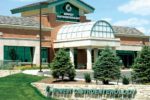Covering the Bases and Delivering the Royal Treatment to All
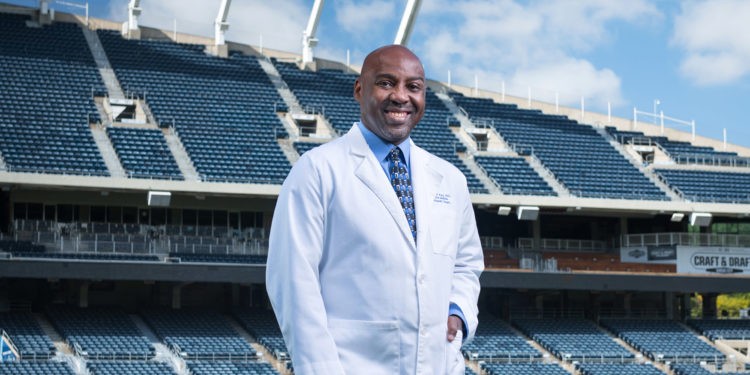
By taking a comprehensive team approach to all he does, Dr. Vincent Key cares not only for star athletes but for everyday competitors, as well.
Story by Ann Butenas | Photography by Matt Kocourek | Sponsored Content
Ralph Waldo Emerson once noted, “Nothing great was ever achieved without enthusiasm.” By all accounts, then, Dr. Vincent Key with the University of Kansas Health System and Head Team Physician for the Kansas City Royals, has continually achieved one great thing after another, but his commitment to what he does is not motivated by ego or arrogance; instead, it is fueled by unwavering passion for what he does and compassion for the patients he treats. Of course, knowledge, expertise and experience are also part of the equation that has contributed to his success, but it is the enthusiasm, passion and motivation for what he does that flips the switch.
Certified by the American Board of Orthopaedic Surgery with a Certification of Added Qualification in Sports Medicine, Dr. Key completed a fellowship at Wellington Orthopedics & Sports Medicine/ University of Cincinnati Sports Medicine upon earning his medical degree from the University of Oklahoma College of Medicine. Additionally, he completed his residency at Martin Luther King-Drew Medical Center in Los Angeles, California, which boasts one of the top trauma centers in the country. Dr. Key’s practice interests within the realm of sports medicine include shoulder and knee arthroscopy; shoulder and knee reconstruction (ACL), ulnar collateral ligament (elbow) reconstruction and UCL repair. Dr. Key has been in practice for 20 years and with the Royals organization for the past decade as Medical Director and Head Team Physician.
While his stellar credentials speak for themselves, it is the heart of the matter that makes up the bones of who Dr. Key truly is.
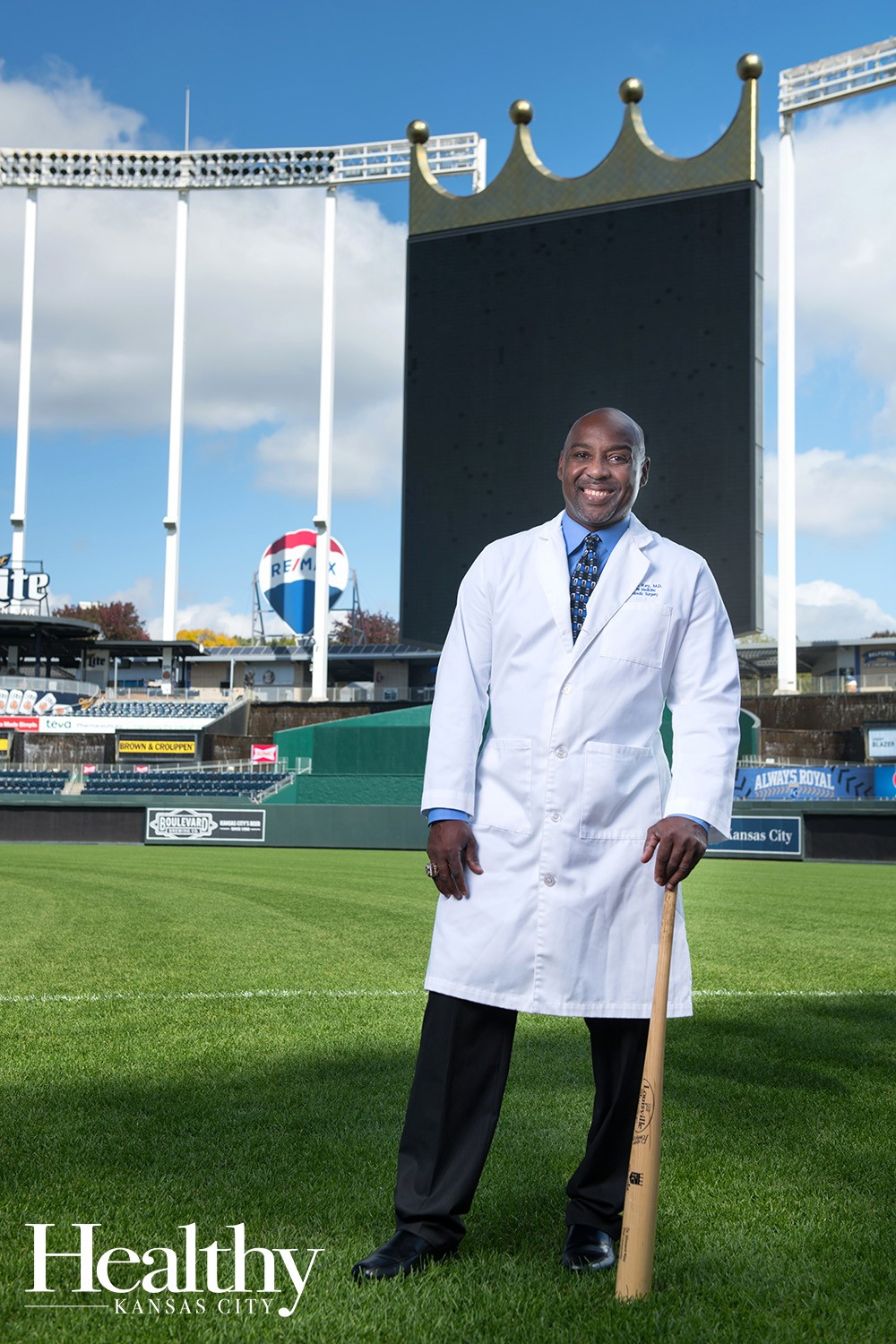
A respected physician who treats the patient; not just the injury.
Dr. Key became a doctor for one simple reason: he loves to help people. That inspiration, along with his passion for sports as a student athlete growing up, fueled the fire for his motivation and ambitions. Further, his mom and aunt both worked in the healthcare field, so his exposure to the field of health and medicine opened numerous doors of curiosity to him early on in his life.
A self-described “country kid from Kentucky” who moved to the metro area as a teenager, Dr. Key completed high school in Spring Hill, Kansas, and subsequently studied at Kansas State University for his undergraduate work, where he was a stand out on the track team.
“I was one of those college athletes with many injuries,” he quipped. “I’ve had 13 broken bones and two surgeries throughout my life, so I was no stranger to the Orthopedic office. I guess I kind of got used to it.”
Injuries as a college athlete, coupled with an insatiable thirst to understand, diagnose and treat athletes further enhanced his interest in sports medicine. Dr. Key loves getting his patients back to where they want to be physically, but at the same time he provides a cautionary approach to each case.
“My job is to tell you the consequences and repercussions of what you do, not to tell you what you can and can’t do,” he noted.
With four athletically-talented kids of his own, Dr. Key approaches each individual patient as if that person was one of his own family members. His focus is on the patient as a whole, not just the injury.
“What would I do for this patient if they were a member of my family?” he offered. “I treat the individual patient and do not lump them all into one box.”
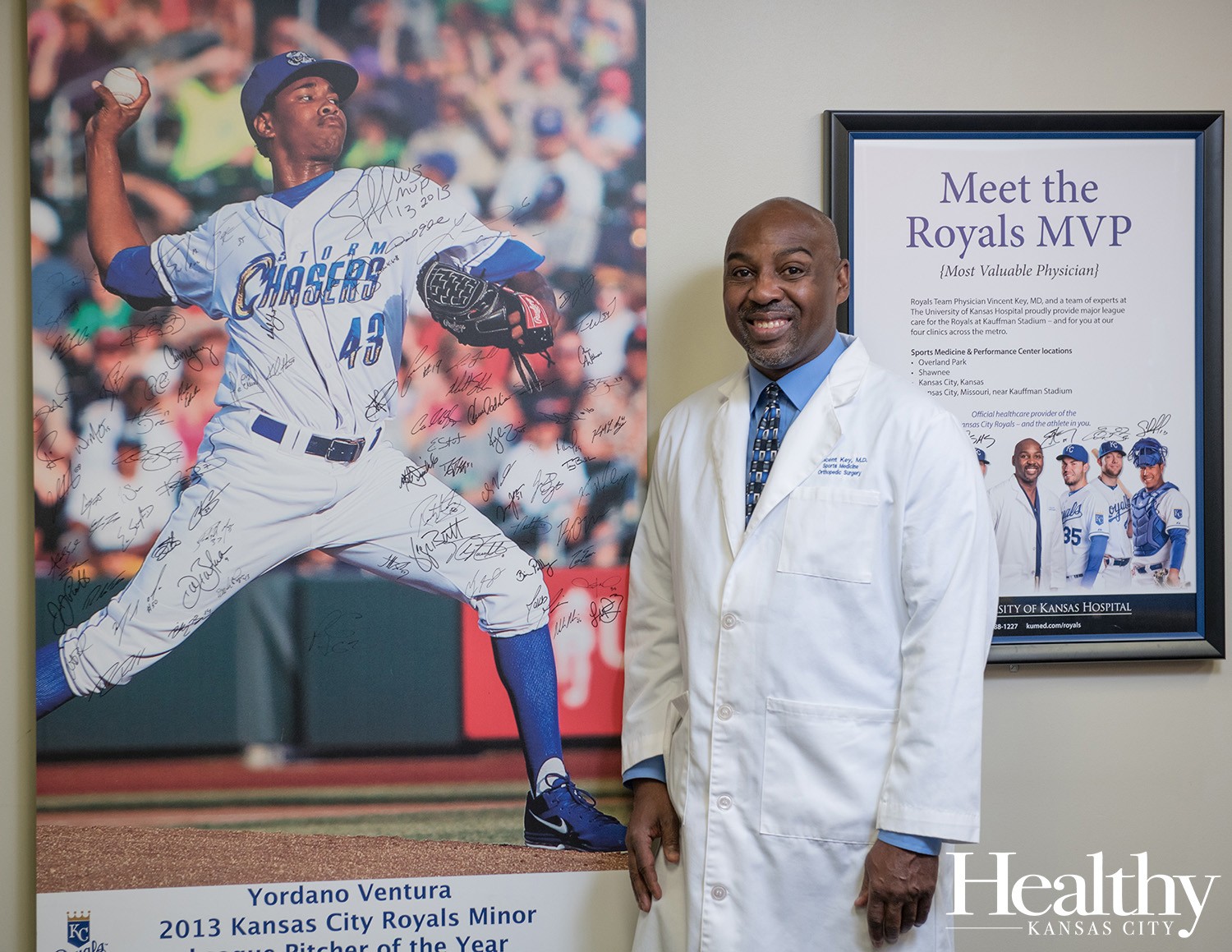
The pinnacle of his profession: treating the Kansas City Royals and making his professional medical playbook accessible to athletes of all levels
As part of Dr. Key’s responsibilities with the Kansas City Royals Organization, which includes 10 teams (Major and Minor League), he oversees the day-to-day operations of its medical staff and coordinates care for all players. Dr. Key is considered a regional expert in UCL Reconstruction and was one of the first to perform the newer UCL Repair/Bridge Procedure in the Region. He performs most of the UCL Reconstructions (Tommy John) in the Royals Organization and has multiple current players throughout Major League Baseball that he has performed the “Tommy John” procedure. He has also served on the Medical Advisory Committee for Major League Baseball, which oversees all medical care throughout Major League Baseball.
“I have the privilege of working with a very forward-thinking and progressive medical staff within the Royals organization, as well as a General Manager (Dayton Moore) who takes the time to listen to what we have to say regarding our players. In 2013 we were recognized as the Best Medical Staff in Major League Baseball. Our staff and the way we have built our medical system is a model in Major League Baseball. No other city can do what we do.”
For example, a major league player went down with an injury in the fourth inning. By the time the game was over, Dr. Key had evaluated him; had the MRI completed and read by a radiologist; and the player was back to the stadium before the last inning.
“That efficiency filters down to my office,” Dr. Key noted. “We have designated appointment slots in my clinic schedule for these young athletes. My team can triage these athletes and determine if they need to be seen that same day. I want to get these athletes in to be evaluated as quickly as possible and have built an infrastructure to do so.”
Nick Kenney, Head Trainer for the Kansas City Royals stated: “In Sports and Medicine, your best asset is availability. Dr. Key is the definition of this for the Royals. His dedication, experience, and holistic approach is what sets him apart as an orthopedic surgeon. We are grateful to have him managing the care of our players.”
“My teammates and I all knew we were getting the best advice and care from Dr. Key on a daily basis to keep us healthy and available for the Royals. We all enjoyed having Dr. Key in our clubhouse and viewed him as a friend and a big part of our team. The Royals and I have been very lucky to have him as long as we’ve had!”
~ Alex Gordon
Dr. Key emphasized the regimen the professional players undergo can also work at the levels at which youth play. As such, he implemented the same “prehab” protocol he uses with the Royals players with the players on Bishop Miege High School baseball team. The success of that was evidenced in the school’s 2019 baseball season, where no shoulder or elbow issues occurred during that season.
“When you arm the athlete, parents and coaches with knowledge, you can filter it down to their level and it works,” said Dr. Key. Knowledge such as beginning to start a prehab protocol approximately 6 to 8 weeks before the start of your practices. To continue to exercise throughout the season and to take 6 weeks off as an off-season. Dr. Key is a huge advocate of playing multiple sports. “Studies have shown that youth baseball players that play and practice only baseball more than 8 months out of the year have a 5 times higher risk of injury that those who do not.”
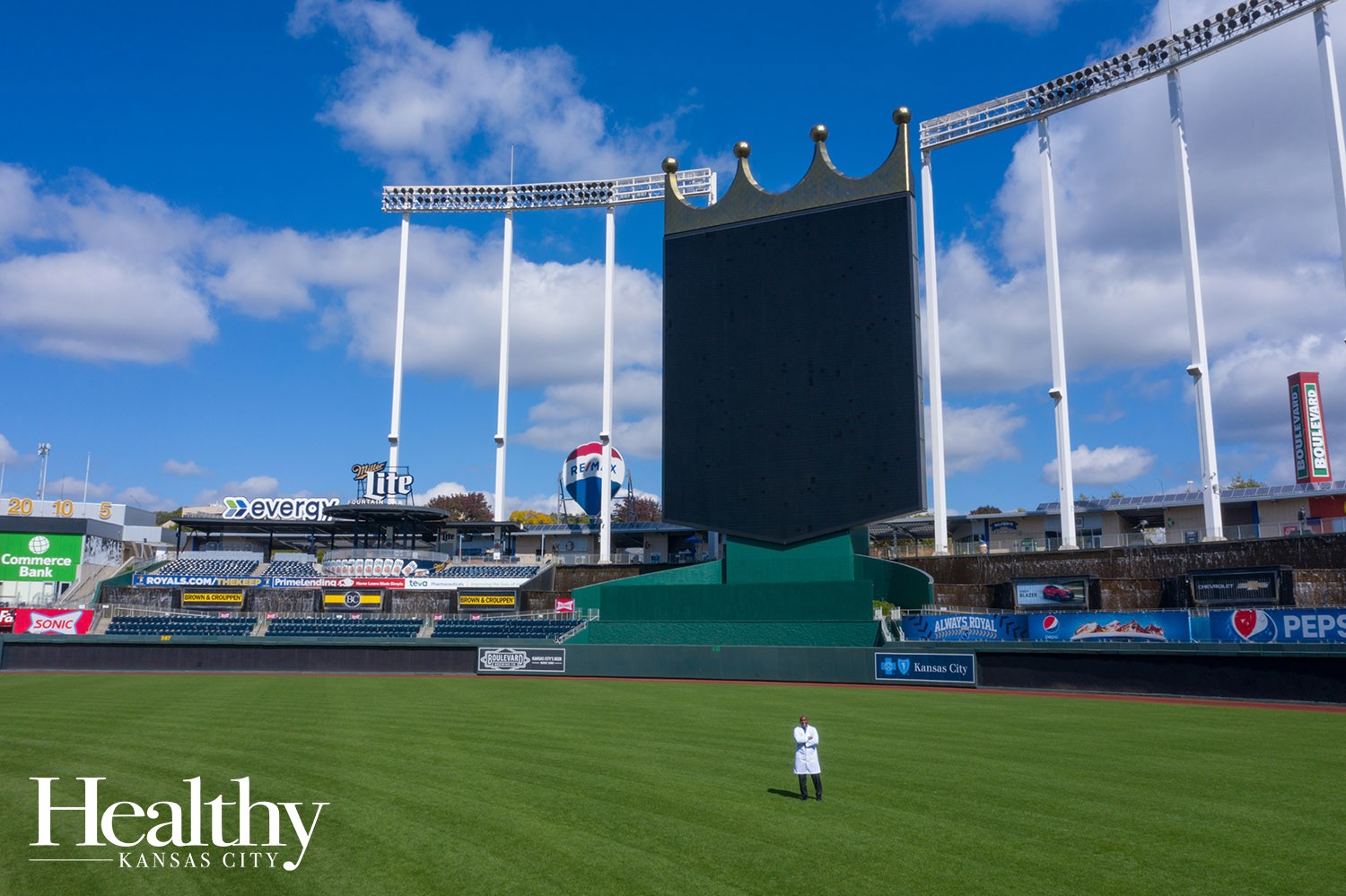
Off the field…
In addition to his work with the Royals organization, Dr. Key sees patients at the University of Kansas Indian Creek Campus in Overland Park, Kansas as well as at the Arrowhead Clinic at the Chiefs training facility and at KU Med West in Shawnee, Kansas. Additionally, he offers an ACL prevention program to help student athletes prevent ACL injuries and to assist youth players rehabilitating from such injuries. As a result of this comprehensive net of care, Dr. Key is regarded as a regional expert in his field. He sees a myriad of athletes and takes great consideration in his approach to each situation.
Because the injuries for all levels of athletes are similar, the prescribed course of treatment is typically the same. Whether a World Series champion or an everyday competitor, Dr. Key’s clinical practice focuses on Sports Medicine, Youth Sports Medicine, multi-ligament knee injuries (ACL and PCL), ulnar collateral ligament (Tommy John) reconstruction and UCL Repair and Bridge, shoulder and knee reconstruction, and sports related injuries, with a strong focus on minimally invasive procedures designed to repair damaged joints.
“I am not just a shoulder and elbow doctor because I take care of baseball players,” he noted. “I also specialize in ACL injuries and am also a knee specialist.”
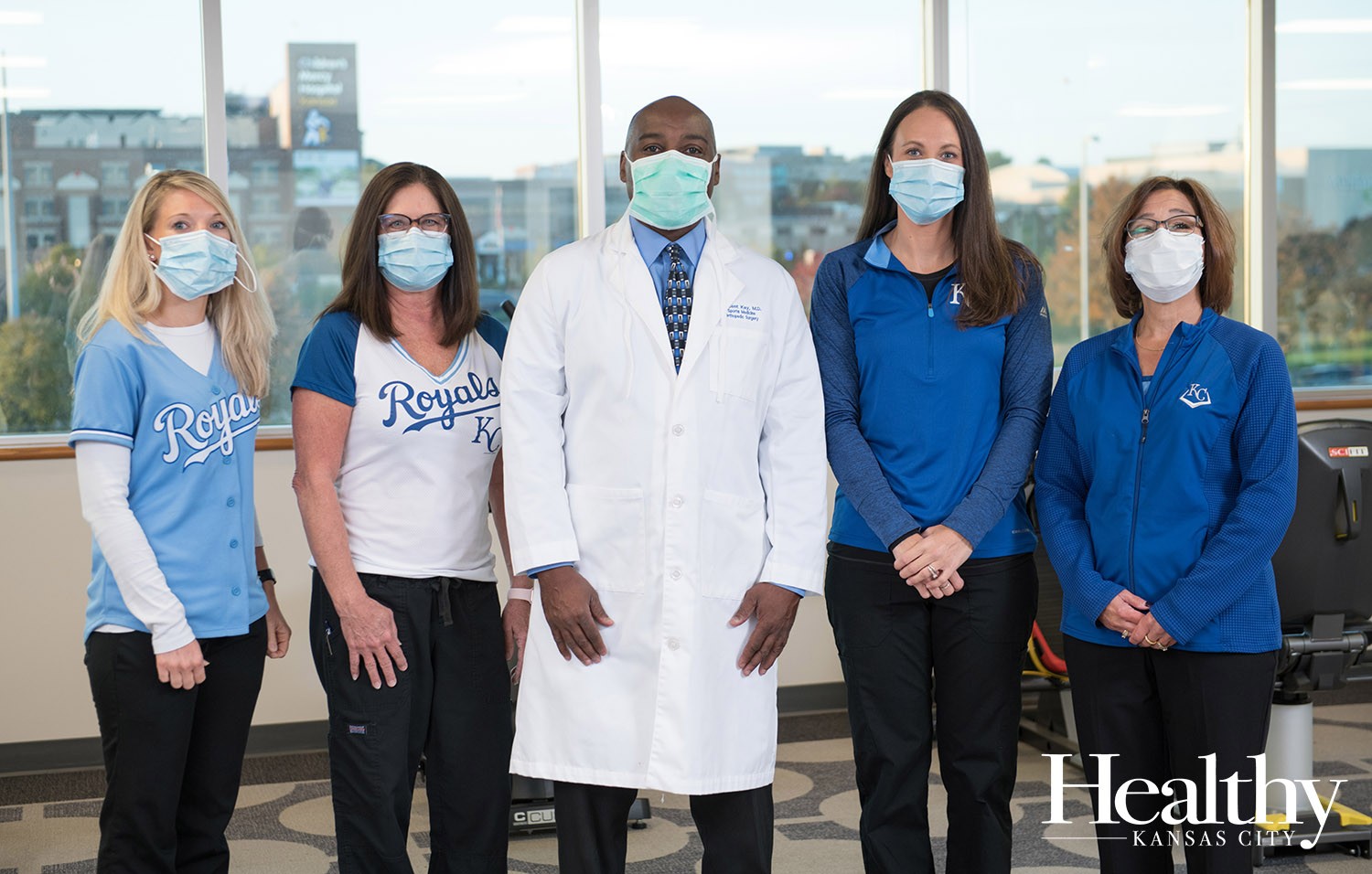
Sports Medicine and Performance Center
Located in Overland Park, they offer a high standard of care, not only in the types of treatments he provides, but also in the manner those treatments and protocols are delivered. Dr. Key also oversees their Arm Care Program which was implemented to help overhead athletes (baseball, softball, volleyball, swimming…etc.). For Dr. Key, education is a critical component of all doctor-patient relationships, and he frequently uses the same approach with his young patients as he does with the professional athletes he treats. Every athlete has tissue; every athlete has bones. However, the type and degree of injury determines the timetable with respect to returning to the game.
“I am huge on education,” he emphasized. “In order to protect your kid, you have to educate them. I like to provide my patients and their parents with as much knowledge and information as possible.” For example, understanding that a superior labral tear in an overhead athlete without a history of trauma (i.e. fall or dislocation) is normal and should only be fixed surgically as a last resort. Also understanding that the scapula provides 1/3 of shoulder motion and stability and strengthening of the peri-scapular muscles needs to be incorporated in the shoulder rehab/prehab regimen. UCL tears are common in throwing athletes. These tears are only relevant if there is a decrease in command or velocity.
Dr. Key continually emphasizes preparation as tantamount for any athlete, advising against just jumping right into the game, as this can quickly lead to injury. Preparation and patience are always important when going the distance in any athletic endeavor.
“If a kid is practicing too much, has a bad kinetic chain, low levels of vitamin D and the bone is bad, that player is more susceptible to injury,” commented Dr. Key.
What is the kinetic chain, then? Anatomically, the various joints and muscles in the body working together to perform movements. If the chain is not good, the one structure that receives the brunt of the bad chain is the elbow, which in turn becomes the victim of everything else not being right. The scenario is quite familiar: young athletes try to ramp up too quickly, leading to overuse and injury. That is when they start having issues and are therefore not prepared to handle the volume and intensity they want to do.
“I see the same issue with professional players,” noted Dr. Key. “The tissues cannot accommodate a sharp increase in activity as we age, so the players are unable to ramp up quickly.” Athletes need to take more time to prepare for their athletic activity.
Therefore, when a patient/athlete has a bad kinetic chain, Dr. Key starts that patient on the same throwing program he uses on his professional players.
“You have to clean up the kinetic chain, and to me, that starts at age 12 or 13, when the forces on the shoulder and elbow go way up once puberty hits,” said Dr. Key. “Students have to warm up properly and get themselves ready to throw.”
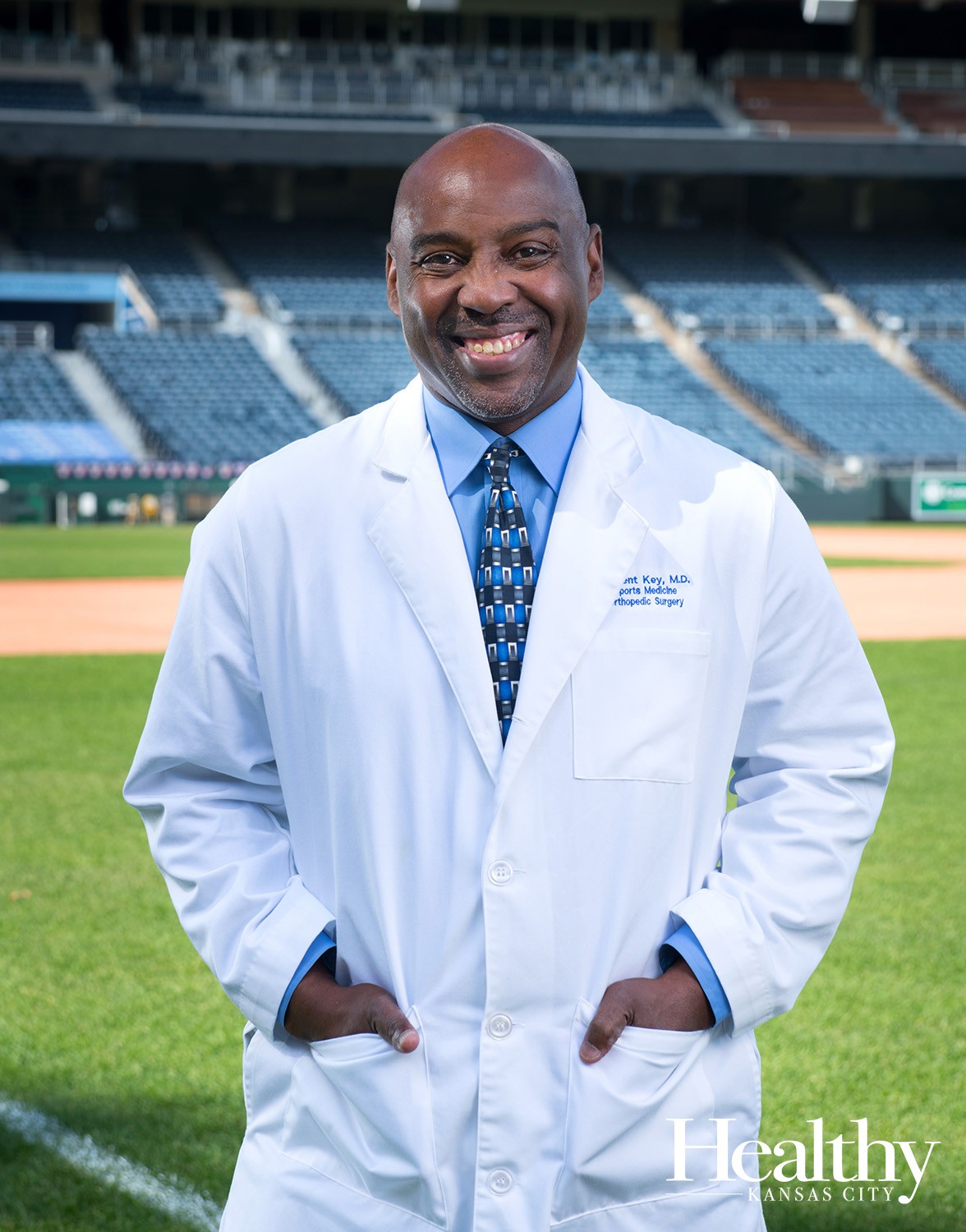
Musculoskeletal Urgent Care and Youth Sports
Sports injuries don’t know the time of day and can strike at any hour. The walk-in clinic at the Indian Creek Campus is where patients can be evaluated, x-rayed if indicated and treated weekdays from 5 p.m.-7 p.m., and during football season are open from 8 a.m.-11 a.m. on Saturdays. Unique to this clinic is that it is staffed by orthopedic surgeons from within the orthopedic department with which Dr. Key works. Translation? Patients get to consult with a board-certified orthopedic surgeon on the spot, not three months from now.
“Greatness is not something you have; it is something you give.”
Giving back to his community is something that comes naturally to Dr. Key especially when it comes to lending a hand to underserved populations. To that end, he takes time to visit the Dominican Republic a couple of times a year to provide physicals on players at the Royals Dominican Baseball Academy and do missions work. Dr. Key also has a special place in his heart for local underserved youth, as evidenced through his volunteer work with the Kansas City Urban Youth Academy. When he first got into sports medicine, Dr. Key did not see people who looked like him, so he wanted to find a place where he could make the greatest impact.
“There are not too many African American orthopedic surgeons or sport medicine physicians to serve as role models for these kids,” stated Dr. Key, who is also the only African American head team physician in all of Major League Baseball. “It’s important for underserved youth and youth in general to see that. These kids deserve a shot and an opportunity to live out their dreams. I’ve given lectures to these kids, not only about arm care in sports but also about life.”
Dr. Key has given numerous talks and help to build throwing programs at various baseball clubs across Kansas City. He has been a Keynote Speaker at the Major League Baseball Winter Meetings.
Medicine is what Dr. Key does; it is not who he is.
Dr. Key understands that if something is worth it to you, you make the time for it. Saying “no” is rarely an option for him because he just cares too much. It’s the go-giving attitude with which he was raised that keeps him in motion.
“I could have been a farmer like my grandpa, but God put this on my plate,” Dr. Key paused and reflected. “Making an impact on young kids’ lives, regardless of race or socioeconomic background helps them see that they can make an impact on the world.”
As for all of his patients, Dr. Key focuses on delivering the best he can.
“I want to get patients in and get them taken care of. That is what I am here for,” he reflected.



